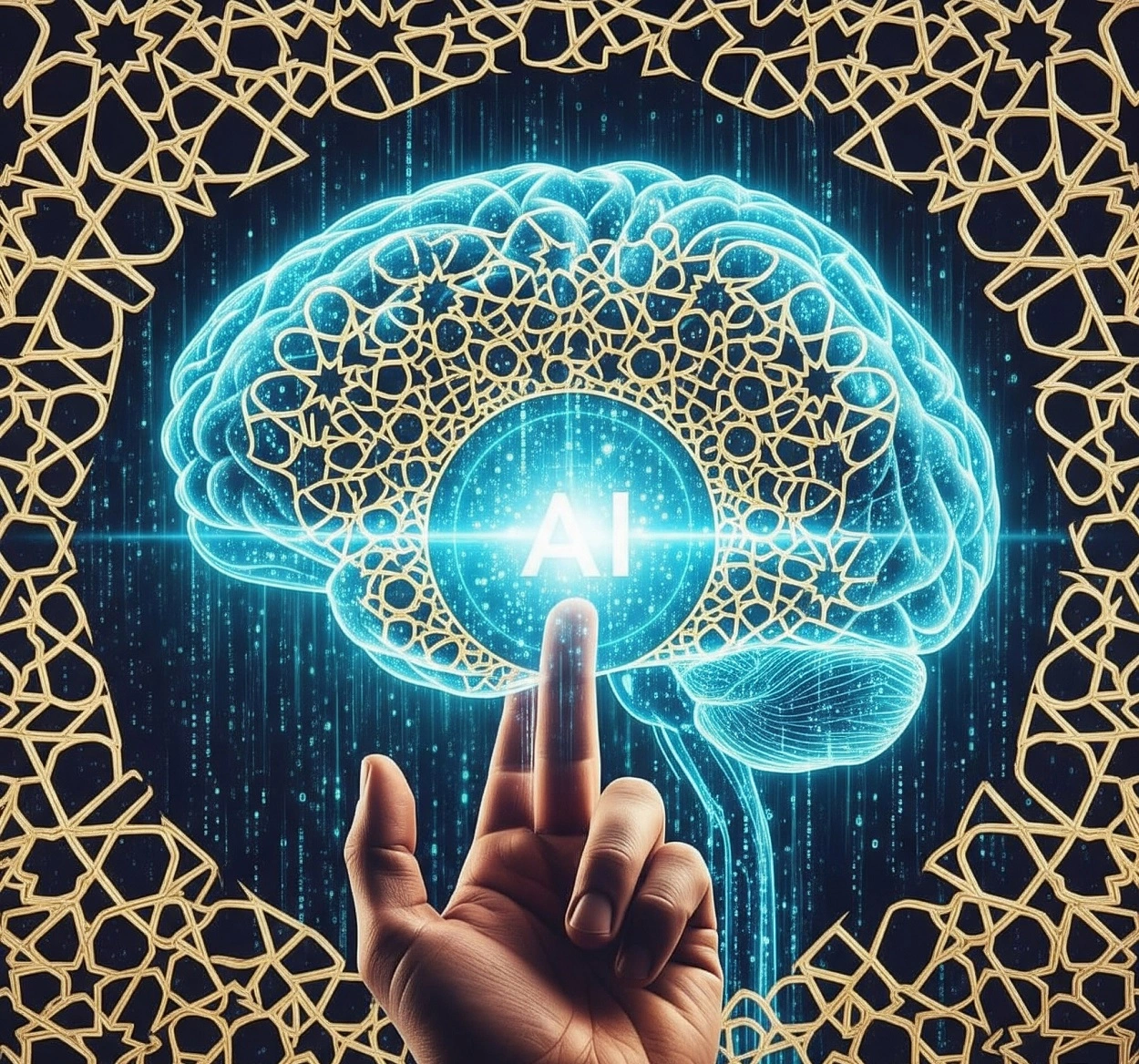AI and Islamic Ethics: Navigating the Future with Reason & Conscience
How does Islam guide AI innovation? Learn about artificial intelligence ethics from an Islamic perspective, the concept of Maqasid al-Shariah, algorithmic justice, data privacy, and AI's potential for human good.

In the 21st century, we’re witnessing a revolution as profound as the invention of electricity or the internet: Artificial Intelligence (AI). From virtual assistants on our phones to systems powering autonomous vehicles and diagnosing diseases, AI has permeated every facet of life. Its potential for boundless progress is clear, yet behind the glimmer of innovation lie deep ethical questions: How do we ensure AI brings good, not harm? Who is responsible if AI makes a mistake?
For us as Muslims, these questions aren’t just the domain of scientists or philosophers. They are a call to reflect on how Islamic teachings—perfect and relevant throughout time—can guide us in developing and using AI responsibly. Islamic AI ethics is the critical lens we need to navigate this digital era. Let’s delve into the intersection of cutting-edge technology and timeless wisdom.
Introduction to AI and Its Development: Why Is Religious Discussion Important?
Simply put, Artificial Intelligence (AI) is the simulation of human intelligence processes by machines, especially computer systems. This process includes learning (acquisition of information and rules), reasoning (using rules to reach conclusions), and self-correction. Its development is rapid, giving rise to various applications from machine learning, deep learning, natural language processing, to computer vision.
Why is it important to discuss AI from a religious perspective, particularly Islam? Because AI is not merely a neutral tool. It’s a product of the human intelligence and values of its creators. Decisions made by AI can have significant ethical, social, and even spiritual impacts on individuals and society. Islam, as a comprehensive guide to life, has principles that can and should be applied to this new domain, creating a relevant fiqh of AI.
The Concepts of ‘Amal Saleh’ and ‘Mizan’ (Balance) in Technology Development: Encouraging Good, Preventing Harm
Islam strongly encourages its followers to innovate, seek knowledge, and advance civilization. However, every progress must be based on good intentions. Two key Islamic concepts relevant here are:
- Amal Saleh (Righteous Deeds): Every innovation and development in Islamic technology must be intended to bring benefit (maslahah) and welfare to humanity at large, and to bring one closer to Allah. Technology that causes harm, injustice, or disobedience does not fall under amal saleh.
- Mizan (Balance): Islam teaches the importance of maintaining balance in all things. In AI development, this means seeking harmony between technical advancement and its impact on human values, justice, and the environment. AI must be built on principles of fairness and goodness, not for domination or destruction.
AI Ethics from an Islamic Perspective: Five Guiding Pillars
How can Islamic principles guide the design and implementation of AI? Here are some pillars of Islamic AI ethics:
1. Objectives (Maqasid al-Shariah): AI as a Pillar of Welfare
Maqasid al-Shariah are the lofty objectives of Islamic law, essentially aiming to achieve welfare and prevent harm. AI, in its development, must support the five pillars of Maqasid al-Shariah:
- Preservation of Religion (Hifzh ad-Din): AI can be used for da’wah (calling to Islam), authentic religious education, or Islamic scholarly research. However, it should not be used to spread innovations (bid’ah), religious hoaxes, or to belittle sacred teachings.
- Preservation of Life (Hifzh an-Nafs): AI can save lives in medical diagnosis, safe autonomous vehicles, or disaster mitigation. It should not be used for autonomous weapons that endanger lives without human control.
- Preservation of Intellect (Hifzh al-Aql): AI can enrich knowledge and support learning. However, it must not induce addiction, spread false information that corrupts reason, or diminish human critical thinking abilities.
- Preservation of Posterity (Hifzh an-Nasl): AI can assist in Sharia-compliant reproductive health or educate future generations. It should not facilitate activities that undermine family order or morality.
- Preservation of Wealth (Hifzh al-Mal): AI can increase economic efficiency and advance Islamic finance. It must not be used for financial fraud, monopolies, or interest-based (riba) systems.
2. Justice and Equality (Adl): Combating Algorithmic Bias
One of the biggest ethical issues in AI is bias. AI algorithms are trained on data, and if that data is biased (e.g., underrepresented for certain groups), the AI’s decisions will also be biased. Islam strongly emphasizes justice (adl) and forbids discrimination.
- Practice: Muslim AI developers must ensure that AI training data is balanced, audit algorithms to detect and reduce bias, and apply principles of justice at every stage of development. For example, in credit scoring or recruitment systems, AI should not discriminate based on race, gender, or social background.
3. Transparency and Accountability: Who Is Responsible?
If AI makes a harmful mistake, who is accountable? This is a key question. Islam emphasizes accountability for every action.
- Practice: AI systems should be designed so that their decision-making processes are explainable (explainable AI). There is a need to establish clear accountability frameworks: who among the designers, developers, or operators is responsible for AI’s impact.
4. Privacy and Data Security: Safeguarding Individual Dignity
AI relies heavily on data. Islam highly values privacy (hurmah) and individual dignity. Collecting, storing, and processing personal data must be done with consent and for clear purposes, and protected from misuse.
- Practice: Developers must implement the highest data security standards, obtain informed consent from users, and ensure data is not used for un-Islamic or harmful purposes.
5. Limits in Creation: AI and ‘Taswir‘
This is an area that requires in-depth study. In Islam, taswir (creating statues of living beings or images of living beings with the intent of worshiping them or imitating God’s creation) is forbidden. However, what about AI that can generate realistic images, voices, or even “create” art or music?
- Discussion: Some contemporary scholars differentiate between true creation (which belongs only to Allah) and representation or simulation. AI does not possess a real soul or consciousness. As long as AI is used as a tool for good purposes and does not claim to be a creator or an object of worship, its use can be permissible. However, moral boundaries are needed to ensure it does not corrupt the concept of tawhid (monotheism) or degrade human dignity. This is a continuously evolving area of AI fiqh.
Positive Potential of AI for the Muslim Ummah: Blessed Innovation
Beyond the challenges, Islamic technology can leverage AI for immense good:
- Islamic Research: AI can analyze thousands of Hadith and Quranic texts, aid in sanad identification, or index Islamic literature for researchers.
- Online Da’wah: Islamic chatbots, personalized da’wah content, real-time translation of lectures. This is a form of smarter online da’wah.
- Education: Adaptive learning platforms for children, AI-powered Arabic language courses, or tajwid (Quranic recitation rules) guidance.
- Islamic Finance: More efficient Sharia fintech systems, riba detection, or more transparent Zakat management.
- Healthcare: Faster medical diagnostics, halal drug development, or personalized diets according to Islamic guidelines.
- Accessibility: AI can help Muslims with disabilities access religious information or interact more easily.
Challenges and Concerns: The Muslim Role in Addressing Them
Certainly, there are concerns that need to be addressed:
- Mass Unemployment: If AI replaces many routine jobs, how does Islam view this economic disruption? There is a need for inclusive solutions involving retraining and social safety nets.
- Moral Issues: The potential misuse of AI for mass surveillance, propaganda, or even mind manipulation.
- Control and Autonomy: How do we ensure AI remains under human control and does not make complex ethical decisions unsupervised?
As Muslims aware of Muslim innovation, we have a responsibility not only to consume but also to actively shape the direction of AI development. This involves education, research, ethical advocacy, and participation in global discussions.
Conclusion: AI for Good, Rooted in Faith
Technological innovation and Artificial Intelligence (AI) ethics in Islam are a symphony between scientific sophistication and divine wisdom. AI holds immense power to transform the world. Our duty as Muslims is to ensure that this transformation leads to goodness, justice, and welfare for all humanity. By adhering to Maqasid al-Shariah, upholding adl, prioritizing transparency and privacy, and recognizing the limits of creation, we can guide AI to be a tool that brings blessings, not calamities.
The future of AI is in our hands. Let’s realize AI that reflects the noble values of Islam.
What are your thoughts on the future of AI within the Islamic framework? Share your ideas and concerns in the comments section!
For further studies on the intersection of technology and Islamic values, visit our ‘Technology & Contemporary Fiqh’ section on our website.





Comments